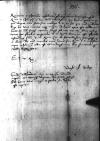Letter #5624
Alexander SCULTETI to Ioannes DANTISCUSFrauenburg (Frombork), 1537-09-25
| received [1537]-09-27 Manuscript sources:
Auxiliary sources:
| ||||||
Text & apparatus & commentaryPlain textText & commentaryText & apparatus
Reverendissimo in Christo Patri et Domino, Domino
Reverentiae et observantiae exhibitione plurimaque commendatione praemissa.
Reverendissime in Christo Pater et Domine, domine colendissime.
Quae diebus proximis per aliquot nostrum facta sunt, intelliget Dominatio Vestra ex his, quae nunc mittuntur. Ego his totus intentus neque magna adulatione opus esse credens hactenus nihil scripsi, attamen scripsi, sed non cito cito. Nunc etiam vix vacat, ut pluribus congratuler Dominationi Vestrae Reverendissimae, satis enim esse, quod omnia cesserint ex sententia Dominationis Vestrae Reverendissimae, cui ad serviendum sum promptissimus et alacer.
Ne autem inanibus meis litteris sim Reverendissimae Dominationi Vestrae molestior, cupio nihilominus eidem esse commendatissimus.
Ex
Eiusdem Dominationi Vestrae Reverendissimae deditissimus
Postscript:
Gaudeo dominum

